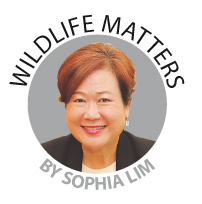MILLIONS around the globe will turn off their lights for Earth Hour, as the world’s largest grassroots movement for the environment unites people to show their commitment to what we call home, Earth.
The consequences of human activities to planet Earth are overwhelming. We saw heat waves across Japan last year as well as here in Malaysia, and record droughts in South Africa.
These phenomena are often linked to climate change and the dire effects are felt by us.
Climate change remains a huge challenge but another urgent threat now demands our attention: the loss of nature. These two combined threats mean we must act – and now.
We’re using the planet’s resources faster than nature can replenish itself. WWF’s latest flagship Living Planet Report 2018 provides clear-cut evidence of the ever accelerating loss of nature and how it puts everyone’s future at risk.
The populations of mammals, birds, reptiles, amphibians and fish have, on average, plummeted by 60% since 1970 – less than a lifetime.
According to official figures from the ongoing inaugural National Tiger Survey, there are less than 200 Malayan tigers in the wild, a significant drop from earlier national estimates of 250-340 in 2014.
Why does nature matter?
Nature is vitally important to our daily lives; it underpins economic prosperity and development, and our very survival. What exactly does nature give us? At their simplest, nature’s services are things people often take for granted – the air we breathe, the water we drink and the food we eat all originate from or rely on nature.
For instance, the Ulu Muda Forest Complex, which spans over 160,000 hectares and comprises seven forest reserves, is where Sungai Muda originates, and this river serves about 4 million people through provisioning of water for the agricultural, industrial and commercial sector, and for domestic use. Therefore, it is important to protect and conserve Ulu Muda forest in its natural state, as it is one of the last large tracts of forest in Kedah. It is also befitting its importance to Kedah, Penang, Perlis and to the nation, as the largest granary areas are found in Kedah and are dependent on the water from Ulu Muda.
Increasingly, the fragility of ecosystems poses huge risks to societal and economic stability.
Too few people understand the vital importance of nature – and the huge threats it faces. Recent WWF research in 10 of the world’s most bio-diverse countries, home to half the world’s population, shows that only 40% of people associate the benefits of biodiversity and nature with necessities of life such as food, water, and fresh air.
For most people, nature feels distant. People in the cities may only experience nature on a screen and therefore, remain disconnected and unaware of how nature is impacting and underpinning their lives.
We need everyone who understands this vital truth to help spark millions of conversations on Earth Hour and start a global movement for change.
We already know the solutions
What we need is a new response, backed by concrete commitments from countries, businesses and individuals to tackle nature loss, climate change and development in an integrated way.
We can be smarter about how we use our oceans, freshwater and land, and how we produce energy, food and other resources. We have the knowledge, technology and capability to move towards a better future for people and nature. And we are already exploring new ways to feed our growing population, meet our energy demands and manage our water supply. Now is the time to get behind these solutions to ensure that everyone gets a fair share without destroying nature.
The next few years are, in fact, critical to put the planet on the path to a better future. The year 2020 sees a historic moment when a number of international conventions converge and key decisions will be taken on the future direction of climate action, development and nature. These decisions will set the agenda for decades to come. We need governments, businesses, financial institutions, civil society and people to commit to halting and start reversing the loss of nature. The unified voice of many millions of people will be needed to challenge decision makers to ensure the loss of nature is top of the agenda.
To achieve a new deal for nature and people we need to be more ambitious and scale up our actions. Science is clear on the problems and solutions to bend the curve on nature loss.
It starts with Earth Hour 2019
It is encouraging to see people collectively standing up for nature by taking part in our Earth Hour events to raise funds for biodiversity conservation. Earth Hour is an amazing opportunity to build a movement for nature and start changing the planet for the better.
Earth Hour takes place tomorrow at 8.30pm. #Connect2Earth by joining WWF-Malaysia’s Earth Hour events in Kedah and Penang, or share your Earth Hour event. Visit wwf.org.my/earthhour
Sophia Lim is executive director/CEO of WWF-Malaysia. Comments: letters@thesundaily.com













